|
|
|
Sort Order |
|
|
|
Items / Page
|
|
|
|
|
|
|
| Srl | Item |
| 1 |
ID:
133403
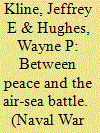

|
|
|
|
|
| Publication |
2012.
|
| Summary/Abstract |
Land-sea wars" have significant maritime dimensions, with command of the sea posited by this study as mattering more than either [land combat] skill or strength. . . . [C]ommand of the sea is a preeminent form of power that determines the outcome of land-sea conflicts.
JOHN ARQUILLA
In a February 2012 article published in the American Interest, General Norton A. Schwartz, Chief of Staffof the U.S. Air Force, and Admiral Jonathan W. Greenert, Chief of Naval Operations, provide solid justification for more closely integrating Air Force and Navy capabilities into an Air-Sea Battle strategy.1 We applaud the Air-Sea Battle component as the most effective means of preparing for the most challenging conflict-full-scale conventional war
|
|
|
|
|
|
|
|
|
|
|
|
|
|
|
|
| 2 |
ID:
133404
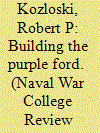

|
|
|
|
|
| Publication |
2012.
|
| Summary/Abstract |
Given the enormity of the U.S. national debt and the pressure to reduce Defense spending, surviving the forthcoming era of austerity will require innovative approaches to Department of Defense (DoD) organization and processes. Some of this innovation may require a reversal of previous efforts intended to improve effectiveness and efficiency within the DoD. Preserving operational capacity must be the top priority in any budget-reduction discussion. Unfortunately, the current approaches advocated within the Pentagon, on the Hill, and by influential Beltway think tanks call for reducing spending by trimming inefficient processes, eliminating end strength, and terminating costly acquisitions programs.
|
|
|
|
|
|
|
|
|
|
|
|
|
|
|
|
| 3 |
ID:
133402
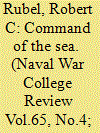

|
|
|
|
|
| Publication |
2012.
|
| Summary/Abstract |
the trade of the world commands the riches of the world and consequently the world itself. For in war . . . the common sense of some and the genius of others sees and properly applies means to ends; and naval strategy, like naval tactics, when boiled down, is simply the proper use of means to attain ends. But in peace, as in idleness, such matters drop out of mind, unless systematic provision is made for keeping them in view.
The last great sea battle occurred in 1944. Since then the world ocean has been open to free navigation by all nations as a matter of American policy. The ability to enforce this policy-or perhaps better said, the absence of serious challenges to this policy-has been in significant part a product of the superiority of the U.S. Navy. Despite a latent and partial challenge during the Cold War by the Soviet navy, since World War II the degree and persistence of U.S. Navy superiority have led most people to take it for granted and have caused the old term "command of the sea" virtually to disappear from the naval lexicon.1 However,
the emergence of a powerful Chinese navy and an associated land-based seadenial force is stimulating a new focus on sea control and overcoming antiaccess/ area-denial efforts. New concepts, such as "AirSea Battle," are being developed and investments made in platforms, weapons, and systems. This activity is critical to American strategic interests and prospects, and it must be informed by an understanding of command of the sea as a foundational concept of sea power. A reconsideration of command of the sea is all the more necessary as political, economic, and technological developments have significantly changed the nature of how sea power influences the dynamics of geopolitical interactions. This article will argue for an extended definition of the term and its renewed application to naval strategy and doctrine.
|
|
|
|
|
|
|
|
|
|
|
|
|
|
|
|
| 4 |
ID:
133406
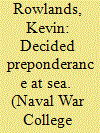

|
|
|
|
|
| Publication |
2012.
|
| Summary/Abstract |
Oliver Cromwell famously declared that "a man-o'-war is the best ambassador"; a twenty-first-century equivalent represents the U.S. Navy in posters and on T-shirts and sweatshirts as an aircraftcarrier over the caption "90,000 tons of diplomacy." Though the images may be different, the message is the same-yet "naval diplomacy" is not a readily understood term. From the coercion delivered by the gunboats of the Pax Britannica to the modern-day exercise of softpower through hardware, interpretations of what constitutes naval diplomacy are wide-ranging. Strategists have undoubtedly long been aware of its existence, but over the centuries few have been moved to study or document it in any substantial way.
|
|
|
|
|
|
|
|
|
|
|
|
|
|
|
|
| 5 |
ID:
133405
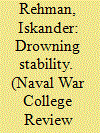

|
|
|
|
|
| Publication |
2012.
|
| Summary/Abstract |
In May 1998, the sun-scorched deserts of the Indian state of Rajasthan shook with a succession of nuclear explosions. Barely two weeks later, in a seemingly tit-for-tat response, Pakistan conducted its own series of detonations, in the remote western hills of Baluchistan. Both nations' previously concealed nuclear capabilities had suddenly burst out into the open, giving a new and terrifying form to the enduring rivalry that had convulsed the subcontinent for decades. Caught off guard, the international community reacted with indignation and dismay. Concerns over nuclear escalation in the event of another Indo-Pakistani conflict refocused Washington's attention on South Asia and triggered the longest sustained level of bilateral Indo-American engagement in history. This had the unexpected benefit of enabling both democracies finally to find common ground, after many years of acrimony, chronic mistrust, and squandered opportunities. Fears of mass terrorism in the wake of 9/11 and subsequent revelations of extensive proliferation emanating from Pakistan added urgency to Western desires to preserve a modicum of crisis stability in South Asia, as well as to prevent any form of escalatory behavior that could spiral into nuclear conflict or further the spread of radioactive material.
|
|
|
|
|
|
|
|
|
|
|
|
|
|
|
|
| 6 |
ID:
133407
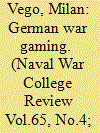

|
|
|
|
|
| Publication |
2012.
|
| Summary/Abstract |
The article discusses the German military's historical use of war gaming, with particular focus given to the early-20th century and World War II. The author begins with a brief general history of war games, beginning with those ancient Gupta Empire in India. The war games implemented by German Field Marshal Alfred von Schlieffen at the turn of the 20th century in anticipation of an invasion of France are described, with emphasis given to their focus on informing subordinate officers of Schlieffen's plans. The educational nature of interwar German war games, especially those of the Reichsmarine (German Navy) is explained. The differences between tactical and strategic games are also explored.
|
|
|
|
|
|
|
|
|
|
|
|
|
|
|
|
| 7 |
ID:
133401
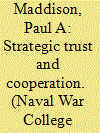

|
|
|
|
|
| Publication |
2012.
|
| Summary/Abstract |
Let me begin by stating how much I appreciate this opportunity to return so soon to Newport after last fall's International Seapower Symposium. On that occasion, I was asked by our host, Admiral Jon Greener, to provide a Canadian perspective on common challenges our navies face in the world's oceans, in what the great American naval strategist Alfred Thayer Mahan, writing from a desk only a few hundred meters from here, described as "a wide common, over which men may pass in all directions."
|
|
|
|
|
|
|
|
|
|
|
|
|
|
|
|
|
|
|
|
|